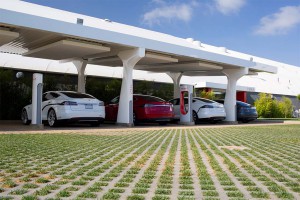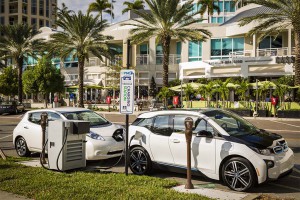
The electric vehicle industry is expected to grow to nearly $60 billion by 2021 as large cities choked by pollution look for ways to resolve that issue.
A new study suggests that with traffic-clogged urban areas leading the way, the amount of money spent on electric vehicles is poised to jump to nearly $60 billion by end of the decade.
ABI Research, which tracks the adoption of innovative technology, is predicting an imminent rise in smart electric mobility as extreme pollution and congestion in urban areas coupled with limited transportation options continues to challenge major cities across the globe. Data analysis forecasts global electric vehicle revenue will hit $58 billion in 2021, more than five times its market value in 2015, ABI said in its new report.
“The role of vehicle electrification in urban areas is part of a broader smart mobility model that includes shared vehicles, charging options, and driverless electric vehicle fleets of cars, buses, trams, and light rail,” said Susan Beardslee, Senior Analyst at ABI Research.
“No singular option prevails; in fact, innovative manufacturers are creating ways for them to converge,” she said.
(New Genesis brand to add plug-in hybrid power. For more, Click Here.)
The ABI noted that a variety of companies have indicated they are working on electric vehicle concepts that could fit in urban areas. Automotive manufacturers such as Ford and BMW, fo example, are considering electric bikes that could fit and charge inside of a car. The goal is for drivers to then be able to ditch their cars and use the bikes as a more eco-friendly mode of transportation to complete the last leg of long journeys.

Get used to sights like this as Nissan and BMW are partnering to develop hundreds of new faster charging stations across the U.S.
Similarly, Tier 1 companies, like Continental, are designing and manufacturing batteries and engines that can better accommodate small, personal electric vehicles.
China is one region pushing particularly hard to make electric vehicles a reality, with regional vendors like BYD outselling larger OEMs Chevrolet, Nissan and Tesla and new urban electric transportation categories continue to emerge, such as three-wheeled vehicles.
“The U.S. is taking longer to embrace the trend, though, with many residents expressing hesitation to let go of their private, singular vehicles as we move toward a shared, smart mobility transportation model,” said Beardslee.
(Click Here for details about the 17 fuel cell models hitting the market in the next decade.)
“Once the price point of electric vehicles starts to drop, as evident with Tesla’s Model 3 and the forthcoming Chevy Bolt, and manufacturers address range anxiety, we believe that the U.S. market will see a jump in its sales. Over time, we expect greater adoption through fleet purchases including Uber and Lyft,” she said.
Meanwhile, personal mobility companies VeloMetro and EcoReco are exploring whether shared fleet of vehicles can work. Both companies are rolling out innovative personal transport vehicles that they plan to pilot with universities and municipalities in the months ahead, Beardslee noted.
“While the market’s current lack of sufficient standards and infrastructure is impacting the broader adoption of electric vehicles, we believe that the greater access, variety, and flexibility of electric vehicles and increasing urban congestion will positively influence future electric vehicle deployment and adoption,” Beardslee said.
“The long-term forecasting of global energy needs from Exxon shows the sobering impact of an unsustainable 35% to 140% increase in energy requirements. Global consortia and public and private partnerships will continue to be leading efforts resulting in necessary change to our transportation industry.”
(Honda will offer battery version of the new Clarity, too. Click Here for the story.)
ABI Research employs a team of senior analysts to provide comprehensive research and consulting services through quantitative forecasts, qualitative analyses and teardown services. These findings are part of ABI Research’s Smart Transportation Service, which includes research, market data, insights and competitive assessments.

Thanks. Nice piece.